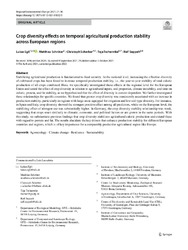Crop diversity effects on temporal agricultural production stability across European regions
DOI: https://doi.org/10.1007/s10113-021-01832-9
Persistent URL: http://resolver.sub.uni-goettingen.de/purl?gldocs-11858/10969
Persistent URL: http://resolver.sub.uni-goettingen.de/purl?gldocs-11858/10969
Egli, Lukas; Schröter, Matthias; Scherber, Christoph; Tscharntke, Teja; Seppelt, Ralf, 2021: Crop diversity effects on temporal agricultural production stability across European regions. In: Regional Environmental Change, Band 21, 4, DOI: 10.1007/s10113-021-01832-9.
 |
Dokument öffnen: |
Stabilizing agricultural production is fundamental to food security. At the national level, increasing the effective diversity of cultivated crops has been found to increase temporal production stability, i.e., the year-to-year stability of total caloric production of all crops combined. Here, we specifically investigated these effects at the regional level for the European Union and tested the effect of crop diversity in relation to agricultural inputs, soil properties, climate instability, and time on caloric, protein, and fat stability, as we hypothesized that the effect of diversity is context dependent. We further investigated these relationships for specific countries. We found that greater crop diversity was consistently associated with an increase in production stability, particularly in regions with large areas equipped for irrigation and low soil type diversity. For instance, in Spain and Italy, crop diversity showed the strongest positive effect among all predictors, while on the European level, the stabilizing effect of nitrogen use was substantially higher. In Germany, the crop diversity-stability relationship was weak, suggesting that crops react similarly to climatic, economic, and political factors or are grown in the same periods. With this study, we substantiate previous findings that crop diversity stabilizes agricultural caloric production and extend these with regard to protein and fat. The results elucidate the key drivers that enhance production stability for different European countries and regions, which is of key importance for a comparably productive agricultural region like Europe.


